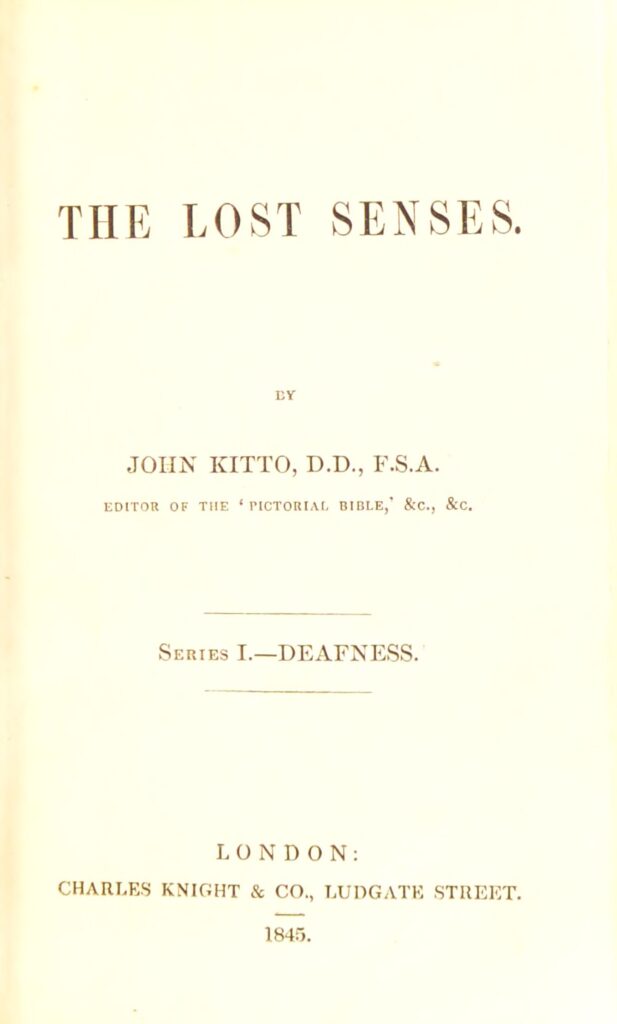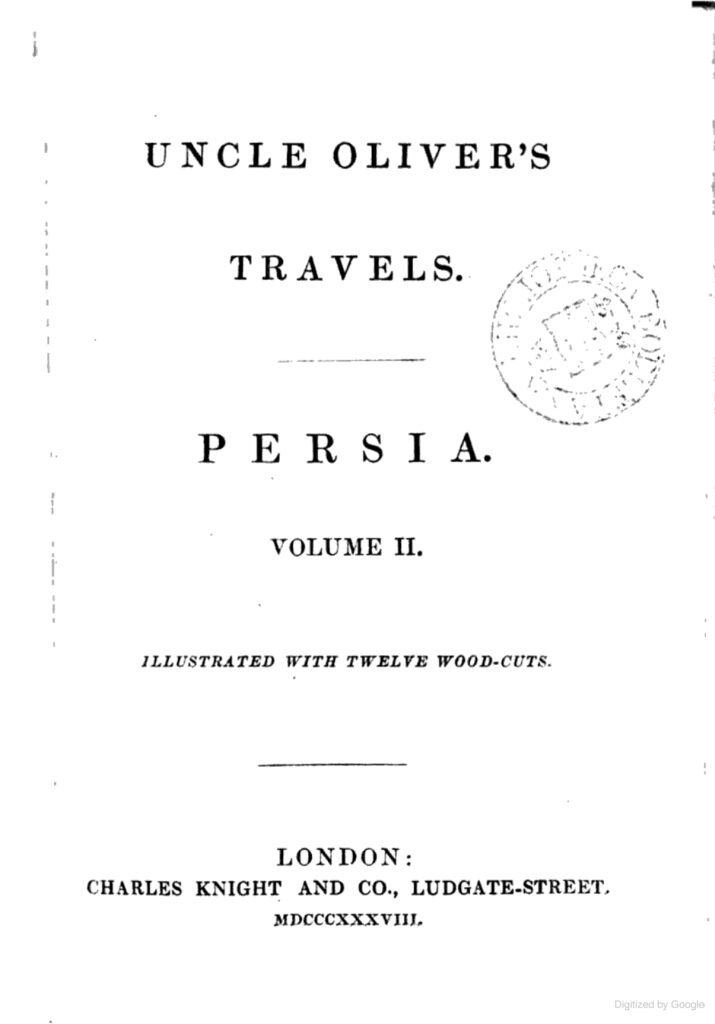The writer and biblical scholar John Kitto (1804-1854) had a complicated relationship with his deafness. Born hearing, he was deafened from a fall at the age of twelve. The accident was traumatic, and, his hearing loss signified a major rupture in his identity and turning point in this life. He worked for the Church Missionary Society for some time in Malta, and then travelled to Baghdad as the tutor for another missionary’s sons. He wrote a travelogue of his journeys, which was published semi-anonymously in the Penny Magazine as a series under the heading “The Deaf Traveler” and signed only by his initials “JK”. Despite the boldness of this title, Kitto, however, was keen to distance himself from those he referred to as “the uneducated deaf and dumb,” particularly those who signed, something, he claimed to have always “abominated”. Back in Britain, Kitto started a different career, as a Biblical scholar. He was a prolific writer, producing numerous Biblical commentaries and analyses aimed at both adults and children. These latter publications were published in his full name. Few could connect his identity as “deaf traveler” with his Biblical scholarship, with readers often unaware that Kitto was deaf. “There has not… been any studious concealment or deep secret in the matter,” Kitto said of the omission, “it has rather been my wish that I should not seem to owe any part of the success I might attain as an author, to the sympathies which my sufficiently singular personal history might be likely to produce (Bar-Yosef 2009, 133) Writing offered Kitto an opportunity to pass as hearing as he was disembodied in his writing. He felt the admiration his work received would be undermined if his deafness was known. Reading all this in the early twenty-first century, I found Kitto’s predicament strangely familiar…

I first came across John Kitto about ten years ago when I was first starting to think about a new project after my PhD on nineteenth-century missionaries. With two deaf cousins, I had been drawn particularly to deafness as an area of research, but (the complicated relationship between deafness, Deafness and disability notwithstanding) I soon branched out into the academic study of disability. Since then, I have examined many historical documents to try to understand the lives of disabled people. I have combed the archives for traces of disabled people’s lives, from census entries, to the minutes of philanthropic organizations, to immigration records to life-writing, including John Kitto’s The Lost Senses (1845), when he finally publicly interrogated what it meant for him to be deaf. I knew these documents were not neutral, that they reflected the construction of particular ways of understanding the body and humanity. But Kitto’s conundrum stayed with me: that is whether to be “out” as a disabled person or, in other cases, even whether to acknowledge such to oneself.
I have always had, what I think to myself as being a “troublesome body” and an “unruly mind.” Diagnosed with both scoliosis of the spine and asthma as a child and then with dyslexia as a teenager, I arrived at university with a Disabled Students Allowance from my local education authority covering, amongst other things, a computer, extra time in examinations and an orthopedic chair. Over the next few years, I struggled with progressively bad abdominal pain, mis-diagnosed as “anxiety,” until one night I was rushed to hospital after a collapse. During emergency surgery I was found to have a huge ovarian cyst that had twisted and killed my right ovary, leaving a tangle of gangrene explaining my excruciating pain of the days before and leading to a diagnosis of scepsis. The operation saved my life, but was a bit of a mess, leading to further scar-tissue operations and pain that has never fully resolved. My mind proved equally rebellious. Diagnosis of serious and enduring mental illness necessitated, and continue to necessitate, endless appointments with psychiatrists and psychologists. More recently my back seemed to be getting worse. Investigations for inflammatory joint pain ensued and in the meantime a diagnosis of Fibromyalgia was added to what was starting to become rather a complicated list of acute and chronic health conditions as well as ongoing disabilities. And yet, despite all this, and even though my academic work increasingly focused on the history of disability, I did not until very recently, identify as disabled – at least not publicly. As in Kitto’s case there was not “any studious concealment” or “deep secret in the matter,” but it is surprising nonetheless. So what was going on? And ultimately, what changed?

My disabled person’s bus pass is, it must be said, very useful. As I had hoped, it saves me a small fortune on the bus route I’m dependent on to get to work. What I hadn’t expected to happen as it plopped through the door some years ago was a minor identity crisis: at that moment it did not seem simply to evidence disability, as it is intended to do, but to create it. My possession of that document meant that, according to the state, I am disabled. Despite my hefty medical notes, historical work on disability, careful reading of the Equality Act and existing self-knowledge that I was disabled (hence my application!), this was, bewilderingly, a shock. And, despite long identifying as a disability advocate and striving to tackle disablism politically and socially, I was equally confused to find some discomfort with this new legal definition which I knew it was imperative to tackle. The significance of my plastic bus pass outgrew its credit-card size proportions and its practical purpose on public transport. I increasingly saw it as a signifier of how I am seen by the state.
How could a disability ally, as I had previously identified, be so discomforted by confronting her own status as a disabled person? How indeed could a cultural historian well-schooled in the social model of disability be disorientated by the complicated relationship between official statements of disability and human identity which, in an historical context, she had allegedly explored? I had for example, written about the way in which historical sources not only documented, but came to construct the lives of disabled people. How the census, to take a classic example, not only recorded deafness, blindness and other ways of being, but created the bureaucratic category of “infirmity” – marking wider patterns of demographic identification, through the administrative process of ticking a box. This was something I should have known. I berated myself. But then became intrigued as to what was actually going on. Was it internalized ableism at work? And, if so, how could this co-exist with my disability politics? Was it because my impairments are, if not wholly hidden in the case of my back, not immediately obvious to others? Was it because some of the conditions that have shaped my life are gendered feminine and others are stigmatized? Or was it because of the privilege I occupy as someone with the power to “pass” as non-disabled (at some moments, in some contexts, to some people and when taking the right medication)?
Some of this is about power. The power to label. The power to define. And also the power to reclaim, to redefine, to challenge. As I write this, I have some anxiety. Is it empowering to publicly claim this label of disability, as I am doing now? Given the historical and recent contexts of ableism in academia, I wondered whether others would use this label against me in my career. Will I be labelled differently as I acknowledge that I am not just a scholar of disability, but a disabled scholar? And how many of these questions stem from the power of ablism that I strive not only to understand but to oppose? John Kitto, is once again on my mind.

I continue to work on disability historically, and feel that grappling with these questions myself focuses my mind, allowing me to consider the personal alongside the specific historic contexts of Britain and its empire on which I work. I read of people diagnosed as “lunatics” on the grounds of “smiling for no apparent reason,” and think of the power of medical professionals to take this smiling person and subsume their identity beneath a new label. I also think again of the census, and the reluctance many census officials found in people self-identifying (or identifying their immediate relatives) as having an impairment. And more, I think of the power of these documents to generate as well as reflect disability, to codify the body and mind, and to shape identity. I knew this before, but since I received my bus pass, I think about it in new ways. My own experiences have led me to reflect further on the power of “official” documentation to not only register disability but to generate these (far from neutral) social categories. And I think again about John Kitto, about his ambivalent relationship with deafness, his fear of condescension, and the power he demonstrated in, eventually, telling his own story.
With many thanks to Rachel Bright, Erin Cullen and Emily Manktelow for their thoughts on the early draft of this and to the anonymous peer reviewers of this piece who have helped my thinking enormously.
—
Bibliography
Bar-Yosef, Eitan. 2009. “The ‘Deaf Traveller,’ the ‘Blind Traveller,’ and Constructions of Disability in Nineteenth-Century Travel Writing.” Victorian Review 35, no. 2 (Fall): 133-154.
Cleall, Esme. 2015. “Producing and Managing Deviance in the Disabled Colonial Self: John Kitto, the Deaf Traveller.” In Subverting Empire: Deviance and Disorder in the British Colonial World, edited by Will Jackson and Emily Manktelow, ch. 7. Basingstoke, UK: Palgrave Macmillan.
Kitto, John. 1845. The Lost Senses: Deafness. London: Charles Knight.
Kitto, John. 1856. Memoirs. Edinburgh: William Oliphant and Sons.
Kitto, John. 1866. The Pictorial Bible […], 4 vols. London: W & R Chambers.
—
Esme Cleall (she/her) is a senior lecturer in the History of the British Empire at the University of Sheffield, UK. She works on the history of disability, race and gender in the British colonial context.